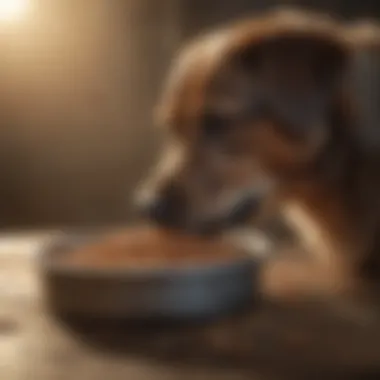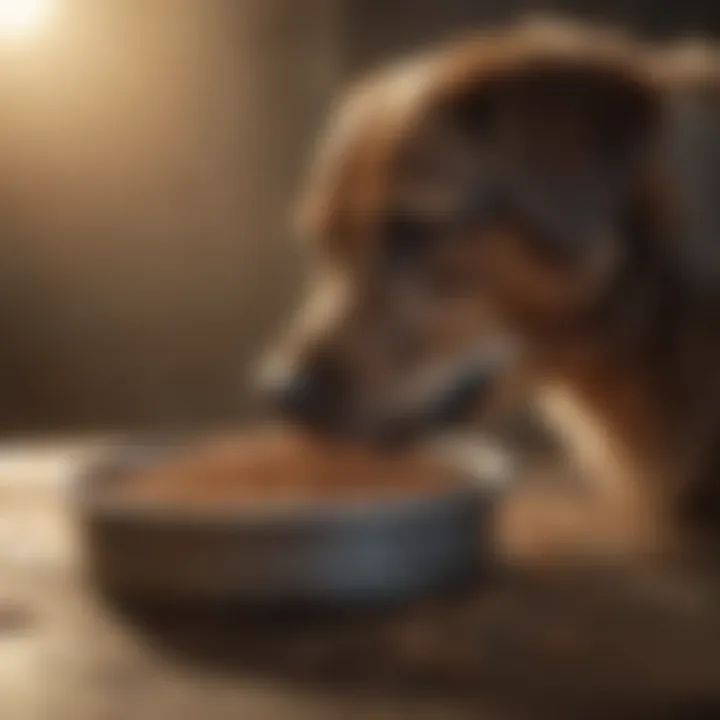Understanding Liquid Stool in Dogs: Causes and Solutions


Intro
Liquid stool in dogs is a concern for many pet owners. It can be alarming to witness, often signalling digestive issues that range from relatively harmless dietary indiscretions to more serious health disorders. Understanding the nuances of what can cause liquid stool is crucial for determining when to seek professional help for your furry friend and what preventive measures you can take to avoid it in the future.
With that in mind, let's explore various aspects of canine digestive health, starting with understanding your pet's individual traits and needs.
Understanding Your Pet
When it comes to canine health, recognizing the unique characteristics of your pet can make a world of difference. A dog's breed, temperament, and any special needs they may have can all play a role in their digestive health.
Breed Traits
Different breeds have different predispositions to digestive issues. For instance, brachycephalic breeds like Bulldogs and Pugs often suffer from gastrointestinal problems due to their shortened snouts, which can lead to swallowing air while eating. Similarly, certain large breeds are susceptible to conditions like bloat, which may manifest as liquid stool due to discomfort in the stomach.
Conversely, some breeds are bred for endurance and have robust digestive systems that can handle a variety of foods. Knowing your dog's breed traits can guide dietary choices and inform you on what issues to keep an eye out for.
Common Temperaments
When evaluating your dog's overall health, understanding their temperament can be important. An anxious dog may experience stress-related digestive issues, leading to liquid stool. On the other hand, a curious pup that tends to scavenge or eat anything in sight might suffer from digestive upsets more frequently. Recognizing these behavioral traits can help you anticipate and mitigate potential causes of liquid stool.
Special Needs
Some dogs may have special dietary requirements due to allergies or intolerances, which can contribute to liquid stool. For example, a dog with a sensitivity to grains may experience adverse reactions when fed traditional kibble. Consulting your vet to identify any specific dietary needs can be a significant step toward preventing digestive disturbances.
Pet Care Essentials
A well-rounded pet care strategy is vital for maintaining your dog's digestive health. This includes everything from nutrition and feeding habits to grooming techniques and overall health management.
Nutrition and Feeding Guidelines
When considering your dog's diet, focusing on quality is imperative. Ensure you are choosing high-quality dog foods that are appropriate for your pet’s age, size, and health needs. Monitor portion sizes to avoid overfeeding, which can contribute to gastrointestinal upset. Moreover, be aware of any treats or human food you're sharing, as these can sometimes cause more trouble than joy.
Grooming Tips and Techniques
Regular grooming can also play a role in your dog's digestive health. While brushing won't directly affect their digestive system, it can help with shedding and reducing the amount of hair your dog swallows, which can also lead to digestive issues. Additionally, keep an eye out for any signs of skin problems or infestations that could also impact their overall health.
Health and Wellness
Regular vet check-ups cannot be stressed enough. They are crucial in identifying any underlying health issues before they escalate. Vaccinations, parasite control, and dental care can all contribute to a more robust immune system and healthier gut, reducing the chances of experiencing liquid stool.
"Prevention is better than cure." Regular health checks can catch issues before they become serious.
Training and Behavior
Behavioral aspects can significantly influence your dog’s digestive health. Proper training not only keeps your pet safe but helps establish routines that can support a healthy digestive system.
Basic Training Techniques
Basic obedience training can help curb undesirable behaviors, like scavenging or eating everything off the ground. Establishing commands such as "leave it" can save your dog from gut problems and reduce the risk of liquid stool from consuming harmful items.
Behavioral Problems and Solutions
If your dog shows signs of anxiety or stress, it may lead to digestive disturbances. Identifying the triggers of such behaviors and addressing them can alleviate underlying causes. Some dogs might benefit from behavioral training or calming supplements, but it’s best to consult with a professional.
Mental Stimulation Activities
Keeping your dog mentally stimulated can also stave off anxiety. Engaging them in puzzle toys or interactive games can reduce stress levels and contribute positively to their overall health, which includes their digestive system.
Engaging with Your Pet
Engagement is essential for the emotional and physical well-being of your dog. It helps build a bond while also ensuring that your pet is active and happy.
Interactive Games and Toys
Consider games that require both mental and physical efforts. Hide and seek, fetch games, or even obstacle courses in your yard can provide a great outlet for energy, reducing stress that may affect digestion.
Safe Outdoor Activities
Outdoor time is also crucial. However, ensure that it's safe for your pet. Meaningful walks in different environments can open up opportunities for sniffing and exploration, which is vital for your dog's happiness and well-being.
Family-Friendly Pet Interactions
Finally, encourage family members to spend quality time with the pet. This not only enhances the dog's emotional health but builds a reliable support system for its needs, including care and health.
Pet Adoption and Integration
If you’re looking to adopt a new pet, understanding how to integrate them into your home is key to smoother transitions.
Choosing the Right Pet for Your Lifestyle


Before adopting, assess your home environment and lifestyle. Different pets have different needs, particularly regarding exercise and grooming. Several breeds will require more attention and care, so consider what matches your lifestyle.
Preparing Your Home for a New Pet
Once you've chosen to adopt, preparing your home is vital. Create a safe space for the new pet to explore and settle, minimizing any risk of digestive mishaps from unexpected items.
Tips for Smooth Prolusion
Lastly, when introducing your new pet to your home and other animals, gradual introductions can ease tension. Monitor interactions and give rewards for calm behavior, helping create a harmonious living environment.
Understanding liquid stool in dogs is more than just a matter of hygiene; it's a window into their overall health. As a responsible pet owner or prospective adopter, staying informed and prepared can make the difference in a dog's well-being and happiness.
Prelims to Liquid Stool in Dogs
When we talk about our furry friends, their health is often at the forefront of our minds. Liquid stool in dogs can be more than just a temporary inconvenience; it may signal underlying health issues that pet owners need to grasp. Understanding this subject can illuminate a range of possibilities, from dietary mishaps to potential illnesses that may require attention. For many, the thought of liquid stool brings unease, but by learning about it, pet owners can take steps to ensure their canine companions lead healthy lives.
Defining Liquid Stool
Liquid stool is characterized by an increase in the water content of the fecal matter, resulting in softer or completely liquid feces. It can vary in color and consistency, and may not always denote a severe issue. However, it’s crucial to identify what qualifies as liquid stool. While any watery fecal matter can be considered liquid stool, subtle distinctions in color and frequency can reveal vital clues about one's dog's health. For example, a sudden change in consistency might indicate something as simple as a brief dietary indiscretion or as complex as an infection.
Why Monitoring Stool Consistency Matters
Monitoring stool consistency is essential for several reasons. Firstly, a dog’s stool can be a direct reflection of their health status. Regular assessments help in spotting any changes early on, allowing for timely interventions. Paying attention to their bowel habits can save a pet from unnecessary distress. Moreover, loose stool can lead to dehydration if it persists, thereby compounding the issue.
"Regular monitoring not only helps maintain your pet’s health but also fosters a deeper bond between you and your canine companion."
Furthermore, changes in stool consistency can also hint at dietary deficiencies or allergies. If you notice that your dog’s stool is consistently too liquid, it may be time to evaluate their diet.
Common Causes of Liquid Stool
Understanding the common causes of liquid stool in dogs is essential for pet owners. Recognizing these causes not only aids in timely intervention but also fosters a greater awareness of your dog’s health and wellbeing. Liquid stool isn’t merely a temporary inconvenience; it could be a signal that something isn’t quite right in your four-legged friend. By identifying the underlying issues, pet owners can better navigate when to consult their veterinarian or take preventative measures to avoid recurrence. Here, we explore five prevalent triggers that can contribute to liquid stools in dogs.
Dietary Indiscretion
Dietary indiscretion is often a leading culprit when it comes to liquid stool in dogs. This term essentially refers to your dog getting their paws on something they shouldn't have, whether it's scavenging during walks or stealing food off the table. Dogs, by nature, can be curious creatures with a penchant for sampling anything that catches their nose. This kind of behavior can lead to digestive upset.
When a dog eats something their stomach can't handle—a greasy leftover or a moldy morsel, for instance—it can result in watery stools.
Moreover, a sudden change in diet can likewise provoke an upset stomach. If it seems like your dog has developed a habit of having an upset tummy post-meal, maintaining a consistent diet may work wonders for their digestion.
Food Allergies and Intolerances
Food allergies and intolerances can be tricky to navigate. Unlike dietary indiscretion, which often involves a single episode, food allergies usually manifest over time and can culminate in chronic symptoms. Common allergens include specific protein sources like chicken or beef, as well as grains and dairy.
When your dog ingests something they’re allergic to, the body reacts by inflaming the digestive tract, leading to liquid stools and other uncomfortable symptoms such as itching or skin irritations.
One way to pinpoint allergies is through an elimination diet. With close monitoring, it becomes easier to identify and eliminate the offending food from their diet, allowing for gradual healing of the gut.
Infections
Infections are another serious concern that leads to liquid stool in dogs. Bacterial infections from spoiled food or contaminated water can upset the digestive balance. Some common bacterial pathogens include Salmonella and E. coli, both of which can cause diarrhea among other symptoms.
Furthermore, viral infections aren’t to be overlooked either. Canine parvovirus, particularly, poses a life-threatening risk if not attended to promptly.
If your dog shows signs of lethargy alongside diarrhea, particularly if they've been having frequent bouts, it’s time to consult your veterinarian to rule out any infectious causes.
Parasites
Parasites can pose a significant threat to your dog’s digestive health, often leading to liquid stool. Common parasites include Giardia, roundworms, and hookworms. While some of these nasties may living comfortably inside your pet without symptoms, others can lead to serious gastrointestinal disturbances.
Regular stool testing and preventive measures like deworming treatments can help keep these unwelcome guests at bay. If a dog is frequently exposed to other animals, a quick parasite check can save you both a lot of trouble down the line.
Underlying Health Conditions
Sometimes, liquid stool is not merely a dietary mishap or an unwelcome case of parasites; it can be indicative of more serious underlying health issues. Conditions like pancreatitis, inflammatory bowel disease (IBD), or even certain cancers can lead to chronic diarrhea.
If your dog has persistently loose stools that do not resolve with dietary adjustments or over-the-counter medications, seeking veterinary advice is crucial. A professional can provide thorough diagnostic tests to ascertain the root cause, ultimately guiding you towards the appropriate treatment options.
Identifying these common causes of liquid stool equips you with valuable knowledge to support your dog’s digestive health effectively. Proactive monitoring of their diet and behavior plays a key role in mitigating risks and ensuring a happy, healthy pup.
Identifying Accompanying Symptoms
Recognizing the symptoms that accompany liquid stool in dogs is crucial for any pet owner. This can provide valuable insight into the root cause of digestive issues. Monitoring changes in your dog's behavior and health can lead to early detection of underlying problems, which can ultimately ensure prompt treatment. Understanding these symptoms not only informs pet owners of potential health concerns but also enhances their ability to communicate effectively with their veterinary professionals.
Changes in Appetite
When a dog is experiencing digestive distress, such as liquid stool, a noticeable change in appetite often occurs. Some dogs may lose interest in food entirely, refusing their usual meals. Others may exhibit the opposite behavior, showing signs of increased hunger or scavenging for food. This change can be linked to discomfort in the gastrointestinal tract. If you notice your dog eating less or more, make a mental note and consider the duration of this change. Tracking how long these appetite shifts last can help the vet pinpoint any underlying issues.
Behavioral Changes
Changes in behavior can be a red flag. Stress, discomfort or illness can manifest in various ways. For instance, a dog in distress might become unusually lethargic or exhibit restlessness—pacing around the room or finding it hard to settle down. On the flip side, an anxious pup may become overly clingy or exhibit more aggressive responses than normal. Observing these fluctuations can help you understand if the problem is merely dietary or something more serious. Keep an eye out for subtle shifts in mood or personality, as these can be significant clues to your dog's health.
Presence of Blood or Mucus
Finding blood or mucus in your dog's stool can be alarming. Blood can appear as bright red streaks or in a darker, tar-like consistency, depending on where in the gastrointestinal tract the bleeding originates. Mucus may indicate inflammation or irritation of the intestines. Both are signs that something is happening in your dog’s body that needs prompt attention. If you spot these issues, it’s best to document what you see and share this information with your veterinarian immediately, as they may require urgent attention.
Vomiting
Vomiting is another associated symptom that can compound the concerns of liquid stool. If your dog is vomiting, especially in conjunction with liquid stool, it becomes imperative to pay attention to the frequency and severity of the episodes. A single bout of vomiting might not be a concern, especially if it seems related to an isolated incident—like eating something they shouldn’t have. However, ongoing vomiting can lead to dehydration and may necessitate a visit to the veterinarian without delay. Keeping an eye on your dog's overall condition alongside these gastrointestinal symptoms will provide crucial context for the vet.
"Understanding the full picture of your dog’s health can help you and your vet navigate any issues more effectively."
By being aware of these accompanying symptoms, you can better assess your dog’s health needs. This understanding not only assists in timely treatment but strengthens the bond between you and your furry companion, solidifying your role as an attentive and responsible pet owner.
When to Seek Veterinary Assistance


Recognizing when a dog’s health has reached a tipping point is crucial for responsible pet ownership. Liquid stool can sometimes be a harmless condition, but often it signals something more concerning that requires an expert’s touch. Understanding the red flags can make all the difference in ensuring your furry friend gets the appropriate care in a timely manner.
Duration of Symptoms
If your dog has been dealing with liquid stool for more than a day or two, it’s advisable to consult your veterinarian. While a bout of watery stool might resolve itself, a prolonged duration can lead to dehydration and nutritional deficiencies. Time is of the essence; the longer your dog experiences this issue, the greater the risk of complications. If you notice that the liquid stool continues without any sign of improvement or even gets worse, don’t hesitate to make that call to your vet. They can help determine if the cause is something simple, like dietary indiscretion, or a more serious underlying health issue.
Severity of Condition
Severity is another critical factor in deciding when to reach out for veterinary assistance. If the liquid stool is accompanied by other alarming signs—such as lethargy, significant weight loss, or abdominal pain—it’s time to act. The condition could be indicative of infections, parasites, or other medical emergencies that may require immediate attention. In instances where the stool contains blood or mucus, make it a priority to seek professional advice. More often than not, a quick intervention can prevent serious health risks down the line.
Concurrent Health Issues
Pet owners should always take into account a dog’s pre-existing conditions when evaluating symptoms like liquid stool. If your pet has previously diagnosed health problems—such as diabetes or an autoimmune disorder—these could very well complicate the situation. Managing multiple health issues can be tricky, especially if one condition exacerbates another. In such cases, it’s wise to err on the side of caution and keep your veterinarian in the loop. They might recommend adjustments in treatment or conduct additional tests to ensure a full understanding of what’s affecting your dog’s health.
Seeking veterinary support early can often make a world of difference in your dog's recovery.
Monitoring your dog's health is a commitment that goes beyond simple observation. By being attuned to the signs and knowing when to act, you can help your furry companion return to their happy, lively self faster. Take note of how long symptoms last, assess their severity, and always consider prior health conditions. It's about being proactive in your pet's wellness journey.
Potential Diagnostic Tests
Diagnosing the underlying causes of liquid stool in dogs can be more complex than it seems at first glance. The potential reasons range from something as trivial as a new treat to more serious health issues. To pinpoint the precise underlying cause, a veterinarian often relies on a range of diagnostic tests. These tests not only assist in clarifying the condition but also help in formulating the right treatment plan. Obtaining a clear diagnosis can greatly influence the recovery process and the overall wellbeing of the dog.
Stool Analysis
One of the first steps taken when addressing liquid stool is conducting a stool analysis. This test allows the veterinarian to observe the stool’s characteristics and content, which can offer vital clues. By examining the stool under a microscope, vets can identify infections caused by bacteria, parasites, or any abnormalities that might indicate inflammation.
- What to Expect: The vet may ask you to provide a fresh sample, which should be collected shortly before your appointment. Ensure the sample is stored in a clean container to prevent contamination.
- Benefits: Stool analysis offers quick information that can indicate whether there’s a need for further testing or an immediate treatment plan. If parasites like Giardia or roundworms are found, appropriate medications can be prescribed without delay.
Blood Tests
Blood tests serve as another fundamental diagnostic tool that can help assess your dog’s overall health. These tests can provide insight into internal organ functions and unveil any signs of systemic infections or inflammation.
- Key Indicators: Blood tests evaluate various components, such as white blood cells, red blood cells, platelets, and liver enzymes. An increased number of white blood cells, for instance, might suggest an ongoing infection.
- Implications for Liquid Stool: If the stool issue is tied to a systemic health problem, early identification via blood tests can significantly enhance the prognosis. Monitoring electrolyte levels can also determine if dehydration is affecting your dog's health due to liquid stool loss.
Imaging Studies
Imaging studies like X-rays or ultrasounds are more advanced techniques that can be employed for diagnosing liquid stool issues in dogs. They allow veterinarians to visualize internal organs and abnormalities that might not be detectable through other means.
- Usage: Imaging can be particularly useful when gastrointestinal obstructions or foreign bodies are suspected. For example, if your dog is suddenly lethargic and has consistent liquid stool, an imaging study might reveal an obstruction blocking the intestines.
- Benefits: It provides a broader picture of your dog’s anatomical health, ensuring that any physical issues are caught early. This is crucial, especially when combined with other tests, to paint a complete picture of the health status.
"A proactive approach to diagnostics can make all the difference in managing your dog’s health effectively."
Ultimately, understanding the importance of these diagnostic tests empowers dog owners. Engaging with the vet regarding these processes lays the groundwork for informed decisions about your furry friend's health. Utilizing these tests can help ensure your dog receives an accurate diagnosis and an appropriate treatment plan tailored to their needs. By staying vigilant and proactive, you are taking significant steps to help maintain your dog's digestive health.
Treatment Options for Liquid Stool
When faced with the issue of liquid stool in dogs, understanding the myriad treatment options can be a real game changer. This section aims to empower pet owners with knowledge that can steer their furry friends back toward comfort and health. Treatment varies based on the underlying cause; hence, a tailored approach is essential. Effective management not only alleviates immediate discomfort for the dog but also promotes long-term intestinal health.
Dietary Adjustments
One of the first lines of defense against liquid stool is oftentimes changing what goes into a dog's bowl. Dietary adjustments can make a world of difference. This could involve switching to a bland diet, which is typically easier on a sensitive stomach. For instance, feeding boiled chicken and rice might be your go-to; it’s light and usually easy to digest.
Pay attention to the quality of the food as well. High-quality dog food that’s rich in fiber can help regulate bowel movements and firm up liquid stool. Conversely, low-quality foods with fillers can exacerbate the issue. Make sure to gradually introduce new foods to avoid shocking their system. A sudden change could spell more trouble than it's worth.
Here are key points to consider when making dietary adjustments:
- Introduce food gradually: Switch to a new diet slowly over a week or more.
- Watch for ingredients: Avoid common allergens and fillers in food.
- Consider fiber: A diet that includes fiber can promote healthy digestion.
Medications
In certain situations, medications may be necessary for treating liquid stool. Anti-diarrheal medications might provide relief, but they should not be administered without consulting a veterinarian first. Some products for humans can be harmful to dogs, so it's essential to have a vet's guidance.
Your vet might prescribe medications to combat underlying infections or infections that are causing digestive upset. For example, antibiotics may be required for bacterial infections, while something like Metronidazole might be suggested for certain intestinal problems. Each medication comes with its own set of instructions and potential side effects, so understanding when and how to use them is key. Always follow the vet’s directions meticulously to ensure safety and efficacy.
Probiotics
Another potent option for treating liquid stool is the introduction of probiotics. These good bacteria can help restore the natural balance of gut flora in your dog's digestive system, which might be disrupted. There are several probiotic products specifically formulated for dogs, and these can be beneficial in managing diarrhea and enhancing digestion overall.
Using probiotics can speed up the recovery process, especially after a bout of liquid stool. They aid in the digestion and absorption of nutrients, and may counteract the ill effects of poor diets or stress. Pets can react differently, so it helps to monitor them after introducing probiotics to see if there are any positive changes.
Ultimately, recognizing the symptoms, understanding the treatment options, and working closely with a veterinarian can lead to effective management of your dog's digestive health. This informed approach not only soothes immediate distress but also fosters a long-term strategy to prevent further occurrences of liquid stool.
Preventive Measures for Maintaining Digestive Health
Maintaining the digestive health of dogs is crucial, as it affects their overall well-being. Liquid stool is often a red flag, indicating that something may be amiss in their digestive system. Therefore, preventive measures play a significant role in reducing the likelihood of occurrences of liquid stools, contributing to a dog’s long-term health.
Quality Nutrition
Providing balanced and nutritious food is the backbone of your dog’s digestive health. One must select high-quality commercial dog food or prepare home-cooked meals that cater to their nutritional needs.


- Ingredients Matter: Opt for dog food that lists meat as the first ingredient. Grain-free options can also be beneficial for some dogs, particularly if they have food sensitivities.
- Portion Control: Feeding proper portion sizes based on your dog’s weight and age is vital. Overfeeding can lead to digestive upset, while underfeeding might not provide sufficient nutrients.
- Hydration: Always ensure that your dog has access to fresh water. Dehydration can exacerbate digestive issues.
By focusing on a high-quality diet, pet owners can prevent many issues that lead to liquid stool.
Routine Vet Check-ups
Regular veterinary check-ups cannot be understated. Routine visits not only help spot potential health issues before they escalate but also ensure that your dog’s vaccinations are up-to-date, which is crucial for avoiding infections that can lead to digestive disturbances.
- Routine Tests: During these visits, vets can perform stool tests to check for parasites, which is especially important if your dog spends time outdoors. Regular bloodwork can also help identify underlying health conditions.
- Professional Advice: Your vet can provide tailored advice regarding nutrition and lifestyle factors specific to your dog, helping you to make informed choices.
Having a diligent check-up schedule goes a long way in preempting health problems, and in turn, aids in maintaining robust digestive health.
Regular Exercise
Activity plays a significant role in ensuring that your dog's digestive system stays in tip-top shape. Adequate exercise not only helps with maintaining a healthy weight but also facilitates proper digestion.
- Variety of Activities: Engage in different types of physical activities, such as long walks, playtime, or agility training, which makes exercise enjoyable. Most dogs thrive on routine but also appreciate a change of scenery from time to time.
- Mental Stimulation: Incorporating mental challenges, such as puzzle toys or obedience training, ensures that your dog is engaged. Stress and boredom can lead to digestive problems, making mental stimulation just as crucial as physical exercise.
In essence, a dog that gets regular exercise is often less prone to digestive issues, including liquid stool.
Staying proactive about your dog's health through nutrition, vet check-ups, and exercise will equip you to deal better with any digestive issues that may arise.
By implementing these preventive measures for maintaining digestive health, pet owners foster a healthier environment for their furry friends. This not only boosts their quality of life but also minimizes the chances of concern related to liquid stool.
Recognizing Emotional Stress as a Contributing Factor
Stress in dogs is much more than just a case of the jitters; it can have serious implications for their health, including their digestive systems. Recognizing emotional stress as a contributing factor to liquid stool is crucial for pet owners who want to provide the best care for their furry companions. Stress can lead to a range of health problems, from changes in appetite to outright gastrointestinal issues. Understanding how emotional stress affects your dog's well-being is a key component in addressing these problems.
Life Changes and Their Impact
Life events can stir the pot for even the most resilient dogs. A new home, the arrival of a baby, or the loss of a family member can trigger stress in your pet. Dogs are creatures of habit and any disruption to their routine can create unease.
For instance, consider a dog who has lived in a cozy urban apartment for several years. Now, the family decides to move to the countryside. The new environment, unfamiliar sounds, and smells can overwhelm the dog, leading to increased stress levels. This may manifest in liquid stool, which is a physical sign that your pet is struggling to cope with the changes. Here are some common life changes that may impact your dog’s emotional health:
- Relocation: Moving to a new place can make them feel insecure.
- New Family Members: The introduction of new pets or humans might disrupt their established social order.
- Change in Routine: Alterations in daily schedule, feeding times, or walks can create anxiety.
Being aware of these factors allows you to monitor your dog's behavior closely, so if you notice shifts in their stool consistency, you can make the connection and adjust accordingly.
Socialization and Recovery
Proper socialization is fundamental for a dog's emotional stability. A well-socialized dog is generally more adaptable and less prone to stress-induced digestive problems. Those early years are important; without sufficient positive interactions with other dogs and humans, your pet might not learn how to cope effectively with new experiences.
Consider some techniques for improving socialization and aiding recovery:
- Gradual Introductions: Slowly expose your dog to new environments or people. This helps them acclimate without feeling overwhelmed.
- Positive Reinforcement: Reward your dog for calm behavior in new situations. This encourages them to associate these experiences with positive outcomes.
- Controlled Playdates: Arrange playdates with other friendly and well-behaved dogs. This interaction is crucial for learning appropriate behavior and reducing anxiety.
- Regular Outings: Taking your dog on regular trips to different places can help them adjust to varying stimuli.
"A stressed dog is not a happy dog, and a happy dog promotes a healthy gut."
Special Considerations for Puppies
When it comes to liquid stool in dogs, special attention must be given to puppies. Their developing bodies and immune systems mean that they are particularly vulnerable to digestive issues. Understanding this facet is crucial, as early identification of stool irregularities can aid in preventing further health complications. The following sections will delve into the key aspects concerning the digestive health of puppies.
Developing Digestive Systems
Puppies, like young children, are in a constant state of growth and change. Their digestive systems are still maturing, which makes them more susceptible to a variety of issues, including liquid stool. The specific nature of a puppy's digestive system development involves several factors:
- Transitioning from Milk to Solid Food: In the initial weeks, puppies thrive on their mother's milk. However, as they reach the weaning stage, their diet shifts to solid food. This transition can lead to temporary digestive upset, resulting in loose stools.
- Enzyme Production: Puppies may not produce the necessary enzymes required to break down certain components of food as efficiently as adult dogs. This means that introducing new foods or treats can sometimes cause an upset stomach.
- Microbiome Development: The gut microbiome in puppies is still developing, and this can affect stool consistency. An imbalance of beneficial bacteria may also result in digestive disturbances.
Given these developments, it's important for puppy owners to monitor their young dogs closely. Any notable shift in stool consistency could be a signal that their digestive system is reacting to recent dietary changes or health issues.
Common Conditions in Young Dogs
Puppies often face unique health challenges that could manifest as liquid stool. Identifying these conditions takes a keen eye and some understanding. Here are some common issues:
- Parasitic Infections: Young dogs are prone to worms like roundworms or hookworms, which can disrupt their digestion and lead to diarrhea. It's essential to keep up with routine deworming as guided by the vet.
- Viral Infections: Certain viruses, such as parvovirus, can lead to severe gastrointestinal symptoms, including liquid stool. Parvo is notorious among puppies and can be life-threatening if untreated. Regular vaccinations are essential to prevent such infections.
- Bacterial Infections: Just like us, puppies can suffer from bacterial infections that upset their stomach. These can stem from contaminated food, water, or environments, emphasizing the importance of hygiene.
- Dietary Intolerances: Some puppies may develop sensitivities to specific ingredients, causing diarrhea. Establishing what foods suit your puppy can take some trial and error, guided by a vet's advice.
Remember: Regular veterinary check-ups can help address and prevent these conditions. Not only can vets provide vaccinations and deworming protocols, but they can also help with diet adjustments tailored to your puppy’s needs.
Culmination
The subject of liquid stool in dogs holds significant weight for pet owners, and this article aims to cement that importance through detailed discussion. Understanding the nuances of this condition is crucial, not just for the immediate concern of your pet's health, but for fostering a long-term awareness of their overall wellbeing. It is essential to recognize that liquid stool can be a symptom of various underlying issues; hence, knowledge equips pet owners to act decisively.
Recap of Key Points
Throughout the article, we have touched on various elements pertaining to liquid stool. Here’s a brief recap:
- Defining Liquid Stool: It is crucial to understand what constitutes liquid stool and why it deviates from normal consistency.
- Common Causes: We've dissected issues such as dietary indiscretion, food allergies, parasitic infections, and health conditions that may contribute to this problem.
- Symptoms to Watch For: Recognizing what accompanies liquid stool — like changes in appetite, behavior, or the presence of blood — is vital.
- When to Seek Veterinary Help: Knowing the right time to consult a vet can significantly impact your pet’s health trajectory.
- Potential Diagnostic Tests: Understanding what tests might be suggested can ease the concern of the unknown.
- Treatment Options: Various treatments, including dietary adjustments and medications, can help restore your dog’s digestive health.
- Preventive Measures: Regular check-ups, good nutrition, and exercise promote long-term digestive health.
- Emotional Factors: Stress can play a role in digestive issues, reminding us that a healthy environment is just as important as a balanced diet.
- Considerations for Puppies: Puppies have unique health needs related to their developing digestive system.
The Importance of Vigilance
Vigilance stands as a cornerstone of good pet ownership. Being attentive to your dog's habits and characteristics allows for early detection of irregularities, which, in this case, may pertain to stool changes. A dog may not exhibit obvious signs of discomfort, hence why routine observation holds immense value. Moreover, recognizing the balance of diet, exercise, and stress can aid in maintaining the health of your pet's digestive system.
"A watchful eye can prevent a small issue from snowballing into a significant health crisis."
Maintaining vigilant practices, such as regular vet visits and dietary assessments, empowers you to protect your furry friend's health effectively. You are the first line of defense; understanding the signs, recognizing changes, and seeking appropriate actions can make all the difference in your dog's well-being.
In summary, the intersection of knowledge, timely action, and emotional support contributes to healthier, happier dogs. The road to managing liquid stool in your canine companion is paved with awareness and proactive care. Stay alert, informed, and, most importantly, caring.



